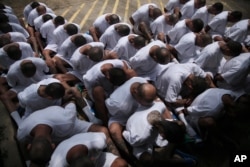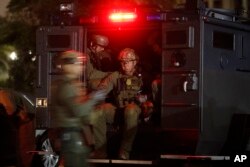U.S. law enforcement officials announced on Thursday the arrest of 267 members of MS-13, a violent gang the Trump administration has vowed to get off America's streets.
The arrests were made in recent weeks as part of a major anti-gang crackdown code-named Operation Raging Bull. Led by U.S. Immigration and Customs Enforcement, the operation swept up 214 MS-13 members in the United States and 53 members in El Salvador, the gang's home base, officials said.
The two-phase operation, aimed at MS-13 members and their global financial networks, was begun under the administration of former President Barack Obama but has escalated under President Donald Trump.
The initial, 18-month phase ended in September and netted 51 arrests in El Salvador, officials said at a news conference in Washington.
The second phase, running from October 8 to November 11, resulted in the latest arrests in the United States and El Salvador.
Administration's efforts
U.S. Attorney General Jeff Sessions touted the arrests as an important step in the Trump administration's effort to stamp out MS-13, whose members have been implicated in a series of high-profile murders around the country.
"President Trump has ordered the Department of Justice to reduce crime and take down transnational criminal organizations, and we will be relentless in our pursuit of these objectives," Sessions said in announcing the arrests. "That's why I have ordered our drug-trafficking task forces to use every law available to arrest, prosecute, convict and defund MS-13."
The only street gang designated by the Treasury Department as a transnational criminal organization, MS-13, also known as Mara Salvatrucha, boasts nearly 10,000 members in the United States, mostly immigrants from El Salvador, Guatemala and Honduras.
In a statement, the Justice Department said a majority of the 214 MS-13 members arrested in the United States were from El Salvador and that 64 members had illegally entered the United States as "unaccompanied alien children."
Sixteen of the arrestees are U.S. citizens and five have legal status in the United States, the department added.
Trump has blamed what he calls the lax immigration policies of the Obama administration for allowing gang members to enter the United States illegally as unaccompanied alien minors.
Root out MS-13
In February, Trump directed the Justice Department to redouble its efforts to root out MS-13 and other transnational criminal organizations. The Justice Department said it's trying to do exactly that.
Last month, Sessions formally designated MS-13 as a "priority" for the department's Organized Crime Drug Enforcement Task Forces, a collective of several law enforcement agencies, including the FBI.
The designation allows the drug task forces that typically focus on organized crime and drug trafficking to use an array of statutes, including gun laws, drug laws and tax laws, to target the gang.
The Justice Department said it has secured the convictions of 1,200 gang members and the arrests and indictments of about 4,000 MS-13 members in El Salvador so far this year.
"These 267 arrests are the next step toward making this country safer by taking MS-13 off of our streets for good," Sessions said.
ICE Deputy Director Thomas Homan said combating MS-13 has long been a priority for the agency.
"However, we are now combating the gang with renewed focus and an unprecedented level of cooperation among DHS's components, and our domestic and international partners," Homan said.






